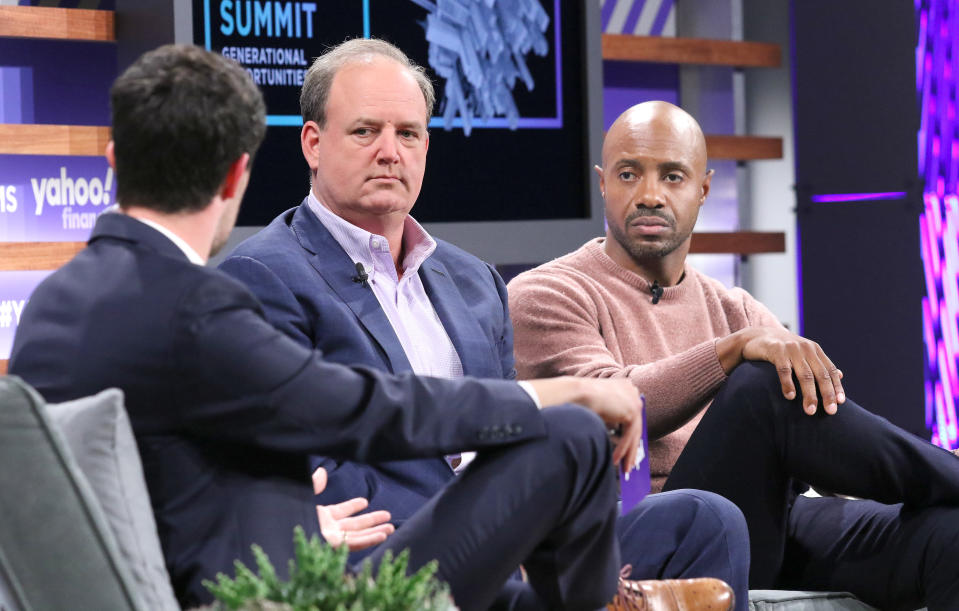ESPN's Jay Williams: Why California's college athlete endorsement bill makes sense
California has placed itself at the center of the long national debate over paying college athletes, after Gov. Gavin Newsom signed into law SB 206, the Fair Pay to Play Act, which will let California student athletes get paid for the use of their name or likeness. The NCAA has vehemently opposed the bill, but it is firmly set to take effect in 2023.
The bill is certainly controversial, but a new Seton Hall Sports Poll found that 60% of American adults support the move. And ESPN basketball analyst Jay Williams, a former Duke basketball champion, is among them.
“My last year in school, my jersey did around $2.3 million in sales,” Williams said on stage at the Yahoo Finance All Markets Summit last week in New York City. “When you return to these schools and you see that your jersey is still being sold, you wonder about, am I inclined to any kind of percent of revenue that's grossed on that? And how does that work? So I think yes, it will make things different.”
Williams pointed out two reasons why allowing college athletes to sign endorsements isn’t necessarily the monumental shift some make it out to be: kids not yet in college are already generating revenue for social media companies with their content; and college athletes, in some cases, have already been getting paid for years, which became obvious amid last year’s NCAA bribery scandal, if it wasn’t obvious already.
“We have these other entities that I mentioned, like OverTime, who are profiting off kids in high school,” Williams said. “So now the content is actually getting younger and younger and younger, so I think you are going to see a lot of kids in high school start thinking about themselves as brands as well... I think the industry has already been disrupted, we're just now finding out about how it's been disrupted for a long time. A lot of that pay-for-play model has already existed for a very, very long time. And I just call that fair market value.”
George Pyne, the former Nascar COO and IMG president who now runs his own VC firm Bruin Sports Capital, sees the benefits in SB206 but also complications in how schools will regulate the endorsements.
“It’s going to open up new categories for the school and create new revenue for the players,” said Pyne, who shared the stage with Williams at the All Markets Summit. “Where it gets tricky, I think, is the regulation of competition... From a recruiting standpoint, you know, if I'm a car dealer at Auburn, am I doing an endorsement to get that player or am I paying that player to come and play? I don't know. And what are the rules around that? I don't know how that works. It's easy for a politician to say, Hey, let's be more equitable to the players—which is fair. But how you do that without disrupting the whole industry is going to be interesting to watch.”

The NCAA has long held up its tenet of “amateurism” as reason not to pay college athletes any compensation beyond an academic scholarship.
But NFL veteran Justin Tuck, who played football at Notre Dame, said in a recent visit to Yahoo Finance, “The argument of ‘amateur status,’ that went out the window a long time ago. College athletes, I look at them as pro athletes now.”
Both Williams and Pyne raised the typical DI college athlete’s daily schedule as a sign that such students are far from amateurs.
“Division I football is 11 months a year,” said Pyne, whose son, a senior in high school, has committed to play football at Notre Dame next year. “You have to go to summer school. You have bowls. You have spring. You're working out in January. You have three or four weeks off a year, and that's it. And that effort is producing billions of dollars of revenues.”
Williams recalled his own schedule when he was at Duke: He would work out at 5:30 in the morning, then go to class, then have other workouts and practice in the afternoon. “Those hours actually almost equate to an employee,” he said, “and I think that's the next step.”
You can watch the full panel with Pyne and Williams from the Oct. 10 Yahoo Finance All Markets Summit here.
—
Daniel Roberts is the sports business writer at Yahoo Finance. Follow him on Twitter at @readDanwrite.
Read more:
ESPN's Jay Williams on NBA in China: 'I would not advise any player to speak out on that'
Jay-Z defends his NFL deal: 'I think we have moved past kneeling'
Joe Tsai buying Nets could usher in new era of foreign money in US sports
Premier Lacrosse League has backing from NBC and Alibaba exec Joe Tsai
Jay Z will lead Puma’s return to basketball sneakers
Read the latest financial and business news from Yahoo Finance
Follow Yahoo Finance on Twitter, Facebook, Instagram, Flipboard, LinkedIn, YouTube, and reddit.
